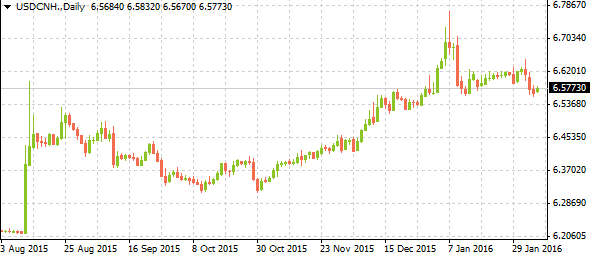This week in China is highlighted by their Lunar New Year, a break for the markets that could seriously use it, giving Chinese policymakers time to dwell on their strategies for tackling one of the stickiest economic situations in recent memory. Heavy pressure on China from all angles means that the only thing lower than current economic forecasts is confidence on the part of consumers, who cannot ignore trends like the mass exodus of capital from their country over the last several months. The last year saw foreign currency reserves in China fall significantly from highs measured in 2014 of $3.99 trillion, dropping more than $99.50 billion in January alone to land at $3.23 trillion according to the People’s Bank of China. The main driver of this flight is undoubtedly the strongly devalued yuan, initiated several times during the latter half of 2015 in order to fight the Dollar’s relative strength. The rapidly declining reserve of foreign currencies has meant that the Central Bank is now required to take a bigger role in capital markets to preserve the liquidity environment.

The enormously difficult transition from an export-reliant economy to a services-centric one has overpowered numerous attempts at stimulus, including the injection of further liquidity and interventions by both the Central Bank and Chinese government to control capital flight. The cost of a program to evolve a major economy into one that focuses more on domestic consumption is extremely high, with figures taken from the last year showing that $513.00 billion worth of foreign currency reserves were spent to achieve that goal among others. The extent to which the situation imbalances the many fundamental targets determined by the Central Bank in creating favorable conditions is extreme, with policymakers juggling employment, steady growth, competitiveness, and other metrics while trying to remain above the $2.70 trillion in reserves determined necessary to preserve the status quo in trade and the exchange rate. However, the overwhelming failures to stop outflows witnessed thus far may require the Central Bank to abandon the yuan peg and risk further devaluation.
